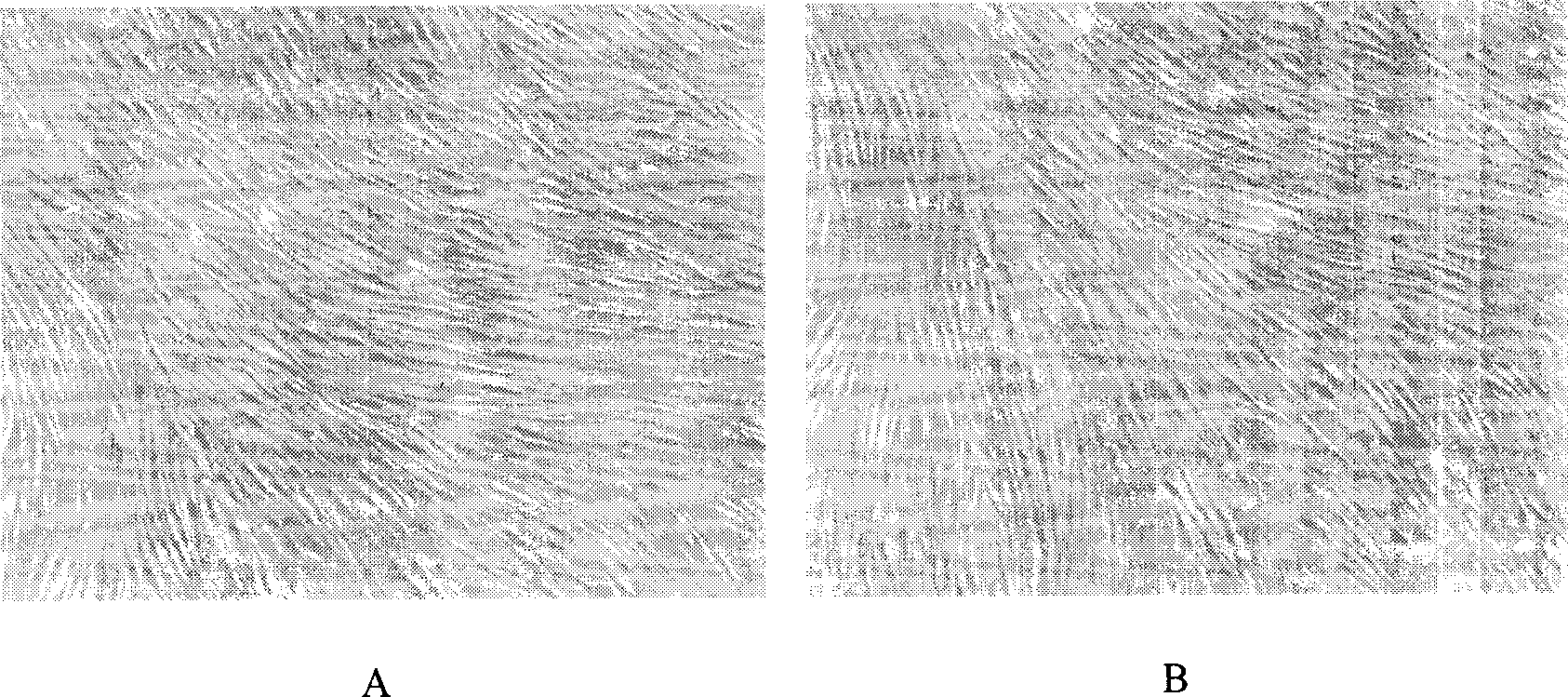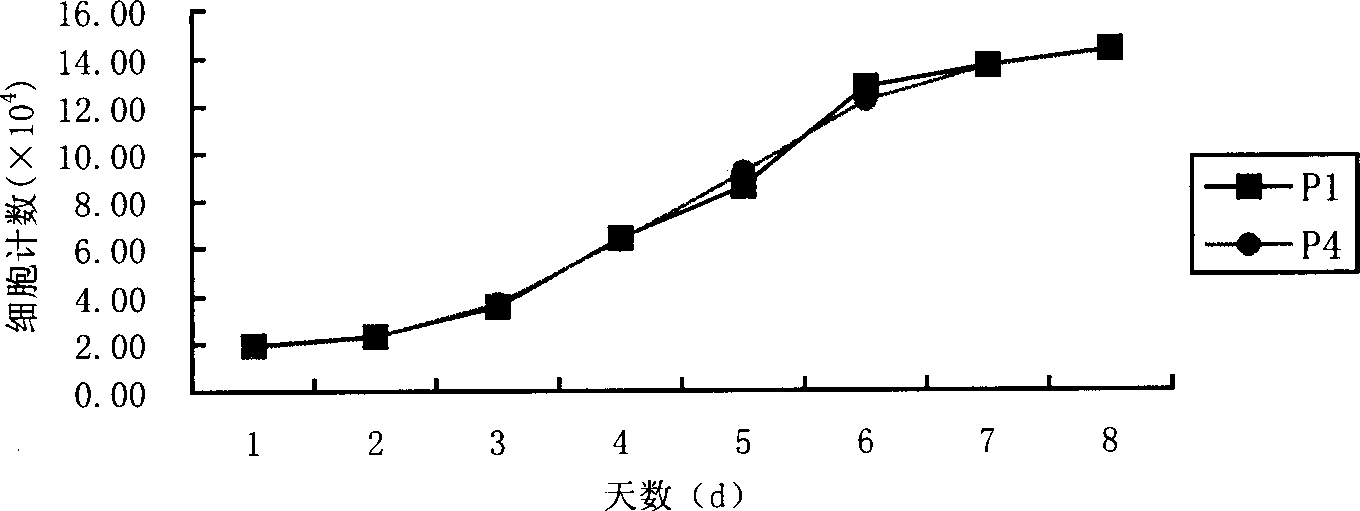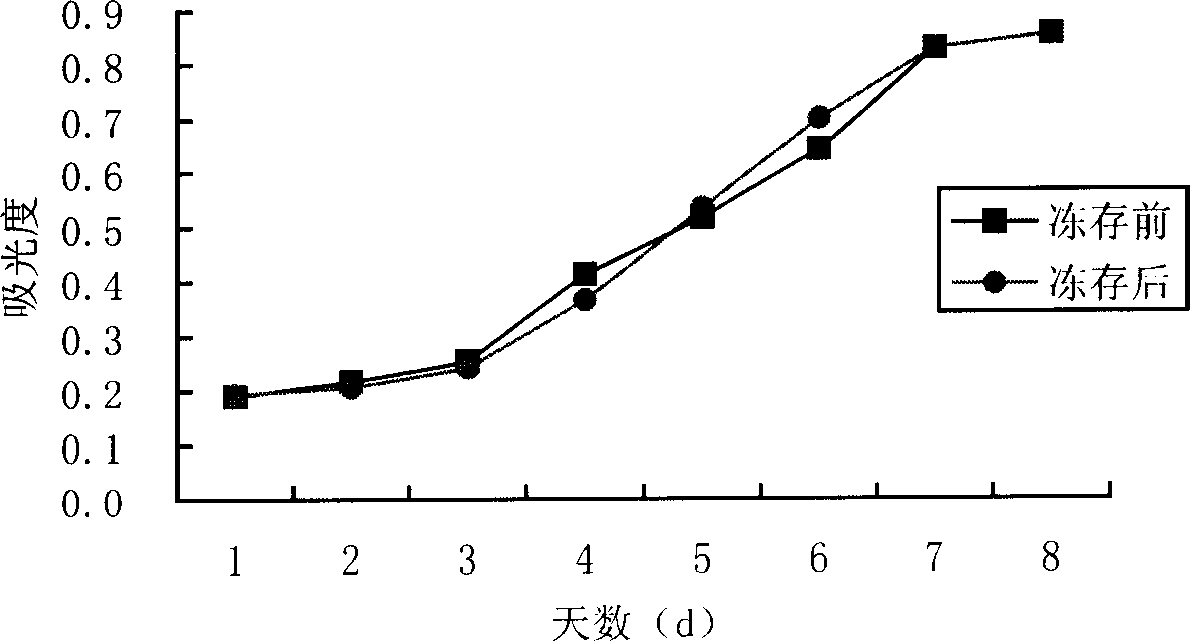Anti-human marrow mesenchyma stem cell monoclonal antibody ZUC3 and its uses
A monoclonal antibody and bone marrow mesenchymal technology, applied in the direction of anti-receptor/cell surface antigen/cell surface determinant immunoglobulin, anti-animal/human immunoglobulin, microorganism, etc., can solve the problem of single specific marker , lack of awareness and other issues
- Summary
- Abstract
- Description
- Claims
- Application Information
AI Technical Summary
Problems solved by technology
Method used
Image
Examples
Embodiment 1
[0031] Example 1: Isolation, culture, identification, cryopreservation and recovery of human bone marrow mesenchymal stem cells
[0032] (1) Isolation and culture of human bone marrow mesenchymal stem cells
[0033] Bone marrow from six healthy donors was collected under aseptic conditions, anticoagulated with heparin, mononuclear cells were collected by density gradient centrifugation with Ficoll-paque (specific gravity 1.077), and the cells were collected in 4×10 5 cells / cm 2 Density inoculation, using low-sugar DMEM (LG-DMED) culture medium containing 10% (V / V) fetal bovine serum, placed at 37°C, with a volume fraction of 5% CO 2 Incubator cultivation. Replace the culture medium after 48 hours, discard the non-adherent cells, and there are spindle-shaped adherent cells, and then change the medium every 3 days, and the primary culture cells adhere to and fuse to 80% to 90% in 15 to 20 days, and the arrangement has obvious directionality , forming swirls, nets, and radials...
Embodiment 2
[0047] Example 2: Preparation and purification of anti-human bone marrow mesenchymal stem cell monoclonal antibody ZUC3
[0048] (1) Animal immunity
[0049] Female BALB / c mice aged 6-8 weeks were used for the first immunization with 2 parts of donor-sourced mixed mesenchymal stem cells of the third to fifth passages suspended in PBS, about 1.0×10 6 / injected into the abdominal cavity of mice only. Immunization was continued on the 8th and 15th day, and the immunization method was the same as the first time. On the 20th day, blood was collected from the eyeballs of the mice after three immunizations, and the serum was separated by centrifugation. The serum was co-incubated with the cultured human mesenchymal stem cells to detect the serum antibody titer by indirect immunofluorescence staining, and the mice with high titers were selected for fusion. Booster immunization once 3 days before fusion, the number of cells is 2.0×10 6 / Only.
[0050] (2) Preparation of hybridoma ...
Embodiment 3
[0057] Example 3: Identification of the specificity of the monoclonal antibody ZUC3
[0058](1) Identification of the specificity of monoclonal antibody ZUC3 in human blood system cells and human cell lines
[0059] Cell material: cultured human bone marrow mesenchymal stem cells, peripheral blood cells, human peripheral blood mononuclear cells separated by Ficoll-paque (specific gravity 1.077), whole bone marrow cells, bone marrow mononuclear cells separated by Ficoll-paque (specific gravity 1.077), HL -60 (acute myeloid leukemia cell line), NB4 (acute promyelocytic leukemia cell line), K562 (chronic myelogenous leukemia blast phase cell line), U-937 (monocytic macrophage cell line from histiocytic lymphoma) Cell differentiation cell line), HEL (acute erythroleukemia cell line), Jurkat (acute T lymphocytic leukemia cell line), Raji (Burkitt lymphoma cell line, B lymphocyte), KM3 (multiple myeloma cell line). Live cell indirect immunofluorescence staining was used to detect t...
PUM
 Login to View More
Login to View More Abstract
Description
Claims
Application Information
 Login to View More
Login to View More - R&D
- Intellectual Property
- Life Sciences
- Materials
- Tech Scout
- Unparalleled Data Quality
- Higher Quality Content
- 60% Fewer Hallucinations
Browse by: Latest US Patents, China's latest patents, Technical Efficacy Thesaurus, Application Domain, Technology Topic, Popular Technical Reports.
© 2025 PatSnap. All rights reserved.Legal|Privacy policy|Modern Slavery Act Transparency Statement|Sitemap|About US| Contact US: help@patsnap.com



